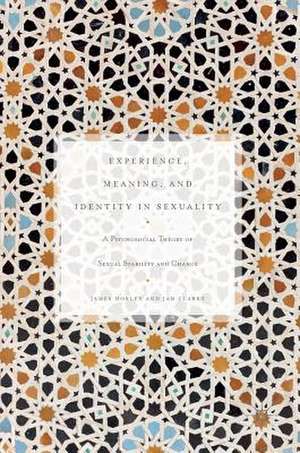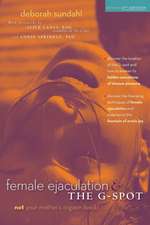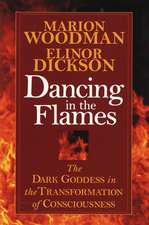Experience, Meaning, and Identity in Sexuality: A Psychosocial Theory of Sexual Stability and Change
Autor James Horley, Jan Clarkeen Limba Engleză Hardback – 21 iul 2016
Preț: 586.55 lei
Preț vechi: 690.06 lei
-15% Nou
Puncte Express: 880
Preț estimativ în valută:
112.24€ • 115.79$ • 93.66£
112.24€ • 115.79$ • 93.66£
Carte tipărită la comandă
Livrare economică 26 martie-09 aprilie
Preluare comenzi: 021 569.72.76
Specificații
ISBN-13: 9781137400956
ISBN-10: 1137400951
Pagini: 304
Ilustrații: VI, 295 p.
Dimensiuni: 148 x 210 x 22 mm
Greutate: 0.49 kg
Ediția:1st ed. 2016
Editura: Palgrave Macmillan UK
Colecția Palgrave Macmillan
Locul publicării:London, United Kingdom
ISBN-10: 1137400951
Pagini: 304
Ilustrații: VI, 295 p.
Dimensiuni: 148 x 210 x 22 mm
Greutate: 0.49 kg
Ediția:1st ed. 2016
Editura: Palgrave Macmillan UK
Colecția Palgrave Macmillan
Locul publicării:London, United Kingdom
Cuprins
1. Introduction.- 2. The Nature and Implications of Personal Construct Theory.- 3. Understanding Multiple Sexualities.- 4. Social Influence on Sexual Constructs.- 5. Power Relations in Sexuality.- 6. Interpreting Sexualised Bodies.- The Commodification of Sex.- 8. Sexual Offenders.- 9. Changing Sexual Interests, Identities, and Behaviours.- 10. Final Concerns.
Recenzii
“Experience is very well researched, with extensive citations throughout. … The authors provide a thorough discussion of the impact of cognition and language, biology, evolution, and culture. … the book provides a holistic view of human sexuality that is unique and interesting. Psychologists interested in personality, cognition, culture, sexology, and the historians of psychology should find Horley and Clarke’s book an interesting read.” (Carlos A. Escoto, PsycCRITIQUES, Vol. 62 (10), March, 2017)
Notă biografică
James Horley is Adjunct Professor of Psychology at the University of Alberta, Canada. He has has worked in forensic hospitals, prisons, and community settings as well as teaching at various Canadian universities. His research and clinical work have focused on sex offender assessment and treatment, but Jim has also conducted research on various topics relevant to social science history and theory.
Jan Clarke is Associate Professor of Sociology at Algoma University, Canada. Her research interests include feminist theory, social movements, science and technology studies (STS), and critical pedagogy. She is a member of the Culture and the Canada-US Border (CCUSB) international research network.
Textul de pe ultima copertă
This book takes the head-scratching out of human sexuality. Personal construct theory provides the foundation for a psychosocial explanation of sexuality that views everyday social interaction as key to the development of sexual identity and desires. The theory developed here accounts for stability and change in sexual identity through an understanding of the importance of experience and the importance of meaning in everyday life. The potential impact of erotica and pornography on sexual desire is discussed, as is the role of social power on sexual behaviour. The variation of sexual expression among individuals—everything from asexuality and sado-masochism to sexual assault—is examined and explained. Formal techniques for changing sexual desires are also presented.
Caracteristici
Uses personal construct theory to explore how human sexuality is a factor in every day life Examines how experience, meaning and identity are central components of a psychosocial account of sexual change and stability Explains why and how sexual expression differs between individuals








